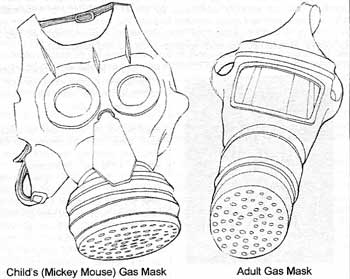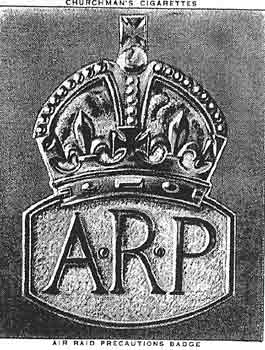|
|
|
Air Raid Precautions (ARP) and the Black-out
Only six years after the 1914-18 Great War had ended, an Imperial Defence Sub-Committee was set up under John Anderson (after whom the ubiquitous air-raid shelters were later named). The letters A.R.P. began to become familiar to local authorities from 9 July 1935, when they received a circular asking them to prepare plans on the subject. The Air Raid Precautions Act two years later formally required them to submit plans for approval. An initially lukewarm response from the general public was given considerable impetus when Hitler declared war on Czechoslovakia and people began to take the threat of war seriously.
In June 1938 Somerset was divided into eight areas, each with its own organiser and staff; the Weston-super-Mare area covered the Axbridge Rural District, which included Wrington.
After early recruitment difficulties, special drives were made and at a special meeting at the John Locke room in January 1939, Mr. F.W. Sheermur, the ARP District Organiser, attended to distribute badges and certificates to those who had passed the required test at the end of their training course. At the same time, Messrs. L. Bisgrove (school headmaster) and J. Sullivan (baker) were elected as Wrington Chief Warden and deputy respectively.
Their team included such well-known personalities as Messrs. Amor, Sparkes, Lynham and Wills. This list included two bakers, a grocer, carrier and a painter.
If anyone had any doubts about the serious state of affairs, the issue of about 38 million gas masks brought it home to them in no uncertain way. Wrington’s share was understandably modest, but no less efficiently handled. By Friday 1 September, the village Wardens, assisted by members of the Fire Brigade and various other committee members, got busy at the Memorial Hall assembling civilian respirators under Mr. Bisgrove’s directions. Such was their enthusiasm for the task that within two and a quarter hours the team had prepared no less than 1450 respirators for distribution.
Gladys Brough, who has lived in the village all her life, vividly recalls the experience of wearing one:
"The blooming old gas masks. We had the ordinary ones – the square boxes, not the Mickey Mouse ones. A lot of the London evacuees used to kick their gas masks around, treating them like a football. These were doled out at the hall along with the ration books. Babies had the red and blue ones and small babies were actually put right inside one. We used to have to practise with them and you couldn't breathe and they'd all mist up - it was horrible. I didn't like them. We were too young to be fully aware of what was going on and be frightened". |
|
|
 |
|
|
|
As the Weston Mercury reported, factually but rather unsympathetically,
“ The Air Raid Wardens were at the Memorial Hall on Monday and Tuesday evening, issuing the respirators, at Redhill School on Wednesday and on Thursday Downside School was open as a distribution centre. If you are still without a gas mask, it is your own fault.”
The fear of imminent invasion was all-pervasive in the spring of 1940; Wrington resident Veronica Lyne, illustrating this rather humorously in a letter to her friend Naomi Smith, wrote;
“On Saturday about 11 o’clock a dramatic telephone message came for Robert to turn out the Home Guard and man the battle positions. This sounded rather like the genuine article at last. Robert, cursing at the cut and finish of his battledress, which seemed to be the size 9 when it ought to have been size 8, departed on his mission.
Eileen and I then collected things and turned the servants’ hall into a sort of G.H.Q. in case we were so badly bombed that we had to live on the ground floor. My selection turned out the curious one – a flannel suit and some underclothes, a box of fudge and a balaclava helmet, but nothing to keep my stockings up, so that my reception of the Germans, had they come, could hardly have been achieved with the dignified calm so strongly advocated by the M.O.I.[Ministry of Information]. After a time it seemed more sensible to await the arrival of the German army in our beds. In fact we passed the most completely peaceful night we had had for weeks. R. returned the next morning - nothing had happened.” |
|
|
Ms. Smith, in her 1941 book Outside Information, drew extensively on her correspondence with Mrs. Lyne - more of which later.
Meanwhile, Mr. Campbell temporarily took over from Bisgrove as Chief Warden, carrying on until June, by which time a replacement had arrived. This was yet another headmaster, Mr. Glanford Waite, who for the previous ten years had been teaching at Worle Church of England School.
Whilst at Worle, Waite had specialised in music, physical training and geography and at his former schools he was in charge of gardening, with which subject he was again to be actively connected at Wrington.
Coincidentally, Mr. Bisgrove left Wrington to become Headmaster of the new Senior School at Worle. |
|
|
|
 |
|
|
The ARP appeared to be in good hands, for Mr. Waite had been one of the first to volunteer for service, and to qualify as an A.R.P. Warden, and had served for a year as Head Warden at Worle. According to the Weston newspapers, it was largely as a result of his untiring energy and enthusiasm that his former parish had been transformed from an area most inadequately provided for in A.R.P. matters to a “model” district. For example, shortly after his appointment as Worle’s A.R.P. chief, he toured many miles in his car one Saturday afternoon seeking volunteers for wardens, and, as a result, obtained a loyal and efficient band whom he led in an exemplary manner. Clearly Worle’s loss was Wrington’s gain.
Of course, although protecting the public from the effects of an air-raid was deadly serious, the service had its funny moments, as demonstrated by the following reminiscence from Ken Schroeder. For a short period of time before joining the Home Guard, the teenaged Ken served as an ARP Messenger, whose job was to maintain vital communication links between the various rescue services in the event of a raid or threat of one.
“ We had to stay in about one night a week – there were about 7 of us. We slept in the inner room of the John Locke Room, just for us messengers. All the others would be sat around a table. If there was an air raid we would have to go and call the wardens out. The wardens would watch out for incendiaries and patrol to ensure no lights were showing. My uncle, Henry Wilkins, who was one of the village bakers, was in the ARP."
Henry was obviously something of a joker, for Ken told me how one night his uncle hid in the tree at Branches Cross and eavesdropped two of his fellow Wardens whilst they berated him for failing to keep a rendezvous with them !
One of the wardens’ other jobs was to give public demonstrations on how to deal with the various consequences of an air attack and in this they were kept permanently busy. On a Monday evening in late June a large crowd assembled in Broad Street to witness members of the Wrington ARP service demonstrate to the public their method of dealing with an attack in which a gas bomb had exploded and where casualties had occurred. The demonstration was for Lewisite, one of the chief war gases, and the arrangements were effectively arranged by Mr. Campbell, with Glanford Waite as the commentator.
When Campbell was called away to active service, Glanford lost no time in appealing for further volunteers. As usual for Wrington, the response was most satisfactory, and was followed by an intensive course of lectures and practical demonstrations. Seventeen presented themselves to Captain H. Wallich (area chief) for the wardens’ test, the following people qualifying as area wardens: Mrs. I. Davis, O. Lancaster and V. Powell, Mesdames V.D. Hollyer and Leggatt, Preb. A.J. Hook and Rev. A.C. O’Han, Messrs. F.R. Brown, J. Clark, T.C. Gunning, G. Hyde, S. Kirk, A.C. Turner and H.Wilkins.
Meanwhile, further lectures and demonstrations in first-aid were being arranged and public ARP meetings were held in the Rectory grounds where Mr. Waite gave the general public advice and instruction in ARP matters concerning the home etc. |
|
|
 |
|
|
|
|
|
|
|
|
|
|
|
|
|

